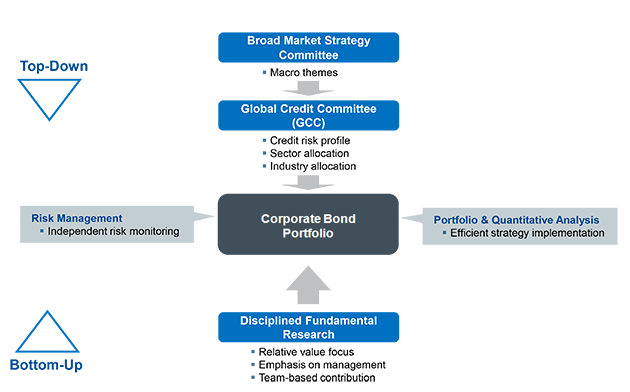What Dictates Your Fund’s Investment Allocations?


 Bottom Up
What companies currently offer, in our view, the best characteristics and prospects to express the output of our credit analysis?
Western combines disciplined credit research with active risk oversight to manage portfolios through the credit cycle. As part of this investment process, Western employs 28 research analysts that are singularly focused on understanding the businesses they are investing in and making recommendations to the portfolio management team. In addition to highlighting potential credit pitfalls, Western is often willing to avoid participating in large index-influencing issuers that are deemed to offer more limited return prospects. Having done their homework, they are able to sell securities that have reached their profit target or to remove a position if their opinion of a company’s prospects has changed. In our actively managed Funds, the focus is on providing thoughtful exposure in an attempt to generate attractive risk-adjusted returns from the asset class.
Ultimately, we believe that a fixed income portfolio constructed with economic rationale provides a more intuitive investment approach than many traditional market cap indexes. With daily visibility into the portfolios, investors can now refine their asset class exposures in corporate bonds with the expertise of a preeminent credit manager like Western.
Bottom Up
What companies currently offer, in our view, the best characteristics and prospects to express the output of our credit analysis?
Western combines disciplined credit research with active risk oversight to manage portfolios through the credit cycle. As part of this investment process, Western employs 28 research analysts that are singularly focused on understanding the businesses they are investing in and making recommendations to the portfolio management team. In addition to highlighting potential credit pitfalls, Western is often willing to avoid participating in large index-influencing issuers that are deemed to offer more limited return prospects. Having done their homework, they are able to sell securities that have reached their profit target or to remove a position if their opinion of a company’s prospects has changed. In our actively managed Funds, the focus is on providing thoughtful exposure in an attempt to generate attractive risk-adjusted returns from the asset class.
Ultimately, we believe that a fixed income portfolio constructed with economic rationale provides a more intuitive investment approach than many traditional market cap indexes. With daily visibility into the portfolios, investors can now refine their asset class exposures in corporate bonds with the expertise of a preeminent credit manager like Western.
Important Risks Related to this Article
There are risks associated with investing, including possible loss of principal. Foreign investing involves special risks, such as risk of loss from currency fluctuation or political or economic uncertainty. Investments in emerging, offshore or frontier markets are generally less liquid and less efficient than investments in developed markets and are subject to additional risks, such as risks of adverse governmental regulation and intervention or political developments. Derivative investments can be volatile, and these investments may be less liquid than other securities, and more sensitive to the effects of varied economic conditions. Fixed income investments are subject to interest rate risk; their value will normally decline as interest rates rise. In addition, when interest rates fall, income may decline. Fixed income investments are also subject to credit risk, the risk that the issuer of a bond will fail to pay interest and principal in a timely manner, or that negative perceptions of the issuer’s ability to make such payments will cause the price of that bond to decline. Unlike typical exchange-traded funds, there is no index that the Funds attempt to track or replicate. Thus, the ability of the Funds to achieve their objective will depend on the effectiveness of the portfolio manager. Due to the investment strategy of these Funds, they may make higher capital gain distributions than other ETFs. Please read the Funds’ prospectus for specific details regarding the Funds’ risk profiles. ALPS Distributors, Inc., is not affiliated with Western Asset Management Company, sub-advisor for the Funds.

Rick Harper serves as the Chief Investment Officer, Fixed Income and Model Portfolios at WisdomTree Asset Management, where he oversees the firm’s suite of fixed income and currency exchange-traded funds. He is also a voting member of the WisdomTree Model Portfolio Investment Committee and takes a leading role in the management and oversight of the fixed income model allocations. He plays an active role in risk management and oversight within the firm.
Rick has over 29 years investment experience in strategy and portfolio management positions at prominent investment firms. Prior to joining WisdomTree in 2007, Rick held senior level strategist roles with RBC Dain Rauscher, Bank One Capital Markets, ETF Advisors, and Nuveen Investments. At ETF Advisors, he was the portfolio manager and developer of some of the first fixed income exchange-traded funds. His research has been featured in leading periodicals including the Journal of Portfolio Management and the Journal of Indexes. He graduated from Emory University and earned his MBA at Indiana University.

